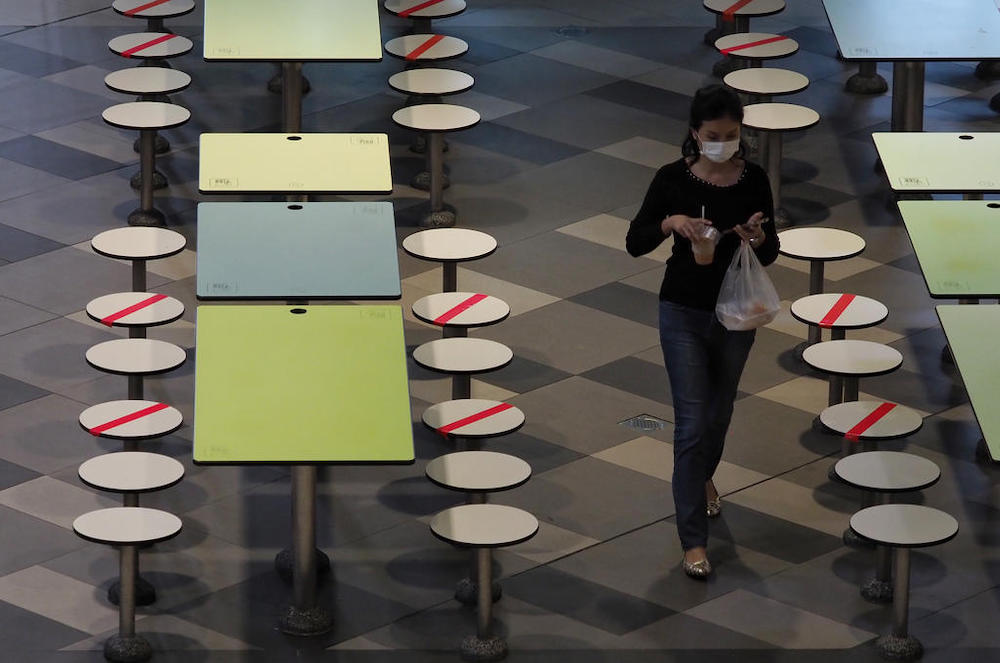SINGAPORE, July 20 — Social gathering sizes will be capped at two persons and dining-in will be banned from Thursday (July 22) to Aug 18, as the authorities seek to put a lid on the recent spike in Covid-19 cases in the community.
“We will do a review of the measures two weeks after implementation, and will adjust further based on the infection situation at that time,” said the Ministry of Health (MOH) in a press release today.
MOH said that community measures would be rolled back to those in Phase 2 (heightened alert), which were implemented from May 16 to June 13.
The rolled-back measures will allow people to gather in groups of up to two — down from the current five. The daily cap of five distinct visitors for each household will also be cut to two each day.
At a press conference by the multi-ministry task force on Covid, its three co-chairs took pains to explain why the authorities have to re-introduce the tightened restrictions.
Health Minister Ong Ye Kung said that Singapore’s public health situation has deteriorated in “a short few days” due to the Covid-19 outbreak at the Jurong Fishery Port.
This is a different situation from the cluster at karaoke lounges and clubs, said Ong, where the cases were among a “fairly specific network of patrons and hostesses”, and therefore, the authorities can contain the infections from spilling into the wider community.
That is why the authorities had previously decided that it could proceed with reopening social and economic activities.
“So long as the cases hover around 40, 50, 60, we can maintain that posture while keeping the cluster under control,” said Ong.
Finance Minister Lawrence Wong added that the tightened restrictions have been imposed to buy the authorities more time to vaccinate more seniors and let those who have received one dose of the Covid-19 vaccine complete their second dose.
Still, Minister for Trade and Industry Gan Kim Yong said this does not change the Government’s plan to move towards living with an endemic Covid-19.
“The direction has not changed. However, when we outline our plans to live with Covid, we also emphasised that we need to raise our vaccination rate,” said Mr Gan.
He said that in the coming weeks, the Government had decided not to differentiate the measures for vaccinated people - an approach which was taken in the earlier set of measures that kicked in only yesterday - but will “consider doing so once we have hit higher vaccination rates, or when the situation has stabilised”.
Adding that additional support will be provided for affected business, he said: “We know that this news is extremely disappointing and frustrating to many, in particular for businesses in sectors such as the F&B... these sectors have been very badly hit, given the earlier restrictions, and have been working very hard to adapt to the changing regulations.”
To allow families to continue with their current childcare arrangements, grandchildren being cared for by their grandparents will not be counted towards the visitor limit or the number of daily social gatherings.
MOH said that individuals should also continue to limit their overall number of social gatherings to no more than two each day, whether to another household or meeting with friends and family members in a public space.
Grandparents are also “strongly encouraged to be vaccinated against Covis-19 to protect both themselves and their grandchildren”.
They should minimise intermingling with grandchildren from different households, said MOH.
At food-and-beverage (F&B) establishments, no one will be allowed to dine in, including at hawker centres and coffee shops.
While they can continue to operate, they will only be able to offer takeaway and delivery options, said MOH.
Strenuous indoor exercise classes, as well as individual and group indoor sports and exercise activities will no longer be allowed.
Other activities that will no longer be permitted include:
· Personalised services that require masks to be removed, such as facials, saunas, make-up services)
· Singing
· Playing of instruments that require intentional expulsion of air
· Non-medical facial treatments
However, these restrictions will not apply to medical and dental consultations that require patients to have their masks removed.
MOH said staff who work at settings with unmasked clients and patrons and have to undergo regular testing will not be required to undergo testing during this period if their business operations are suspended.
Staff members of businesses that will remain open during this period, including F&B outlets that stay open for deliveries and takeaways, will have to continue with the regular 14-day testing requirement.
The testing regime will remain free of charge during this period, said MOH.
Why some countries are opening up faster
Ong also spoke on why countries such as Israel and United States are “so brave and courageous in opening up”. The main reason is that they have higher vaccination rate than Singapore, he pointed out.
These countries have also undergone “waves of very traumatic transmission”. Hence, many among the population are recovered patients with natural immunity.
“Lastly, and very importantly, they have very high rates of vaccination among the seniors, some going up to 90 to 95 per cent, which explains why there’s a lot more confidence in opening up the economy,” said Ong. “So this is also what we should work towards.” — TODAY























